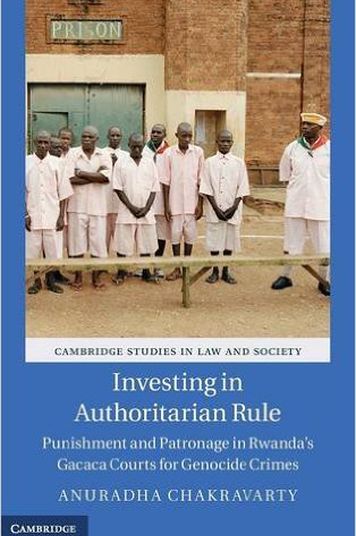Dr. Anu Chakravarty, Assistant Professor of Political Science at the University of South Carolina and ROLC Faculty Associate, recently published “Investing in Authoritarian Rule: Punishment and Patronage in Rwanda’s Gacaca Courts for Genocide Crimes,” a book that takes an in-depth look at Rwanda’s gacaca tribunals and their role in shaping the relationship between the Rwandan Patriotic Front (RPF) government and Rwandan society. Chakravarty’s research focuses on institutions and behavior in conflict and post-conflict situations, particularly in East-central Africa and South Asia. She specializes in designing research and collecting and managing data through fieldwork in high-risk research environments. She spent roughly eighteen months in Rwanda conducting research for the book, collecting data from urban and rural areas in the North, South, East, and West of the country.
The book takes an in-depth look at the incentives behind Rwandans’ willingness to volunteer their service in the gacaca tribunals. After the conclusion of the Rwandan genocide in 1994, the Tutsi-controlled RPF took control of the government. Chakravarty argues that the Hutu majority of the Rwandan population viewed the RPF as lacking in the moral authority to govern because of its record of unaccounted-for war crimes, yet many Hutus agreed to serve in the government-organized gacaca tribunals, often without compensation. Chakravarty’s book explores this paradox, seeking to uncover the incentives that many Rwandans had for serving in the tribunals.
The gacaca tribunals were developed in the wake of the Rwandan genocide as a type of community justice on a massive scale. Faced with a substantial portion of the population accused of genocide, Rwanda was not equipped to meet the staggering demand for justice. In response to this challenge, the RPF government created the gacaca tribunals, which allowed for the local citizenry to try the accused in local, community settings. The gacaca tribunals were largely successful in processing the immense caseload: with over twelve thousand gacaca tribunals established across Rwanda and over one million cases tried, the Rwandan government touted the gacaca system for its efficiency and low costs. Furthermore, the gacaca tribunals were to some extent met with positive attitudes by the Rwandan people who were able to participate directly. For many, the gacaca tribunals provided a sense of closure, forgiveness, or justice for the atrocities committed during the genocide.
Based on the data she collected through her fieldwork, Chakravarty argues that the gacaca tribunals served to bolster authoritarian rule in Rwanda by creating a network of clientelism, a tradition of patronage that she argues can be traced back to the introduction of Christianity to Rwanda, at which time missionaries would dole out rewards in return for allegiance. She argues that in Rwanda, where there is a long history of clientelism, the population understands that demonstrating loyalty to authority figures reaps long-term benefits. For those whose served as unpaid judges, the gacaca tribunals offered an opportunity to gain standing and power in the local community through volunteer service, in some cases leading to subsequent employment in local government. Those who confessed were allowed reduced punishments, and an opportunity to reintegrate into their communities. Those who denounced others in these courts got a chance to heal emotionally by confronting the accused, or to access a range of other private illicit benefits, such as gaining the upper hand in inter-personal struggles and property disputes that were unrelated to the genocide. Chakravarty argues that the gacaca tribunals ultimately encouraged the population to accommodate the RPF government by participating en masse, bolstering the authoritarian regime in the long run.
NOTE: This summary is produced by the Rule of Law Collaborative, not by the original author(s).

